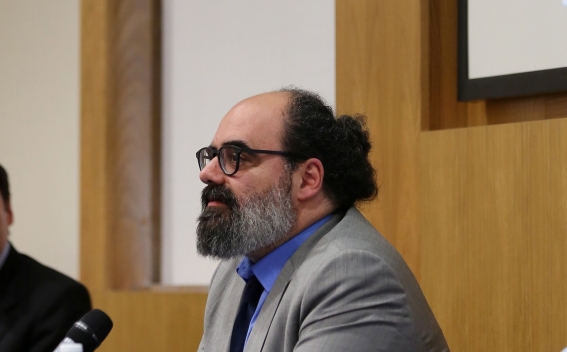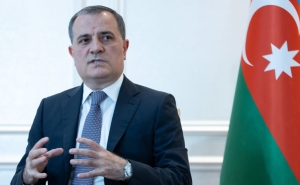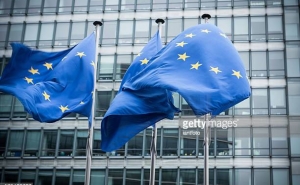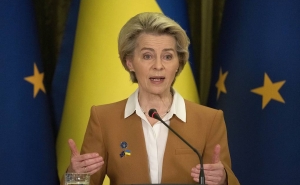Aris Georgopoulos: Brexit Referendum Became a Platform of Expression of a New Kind of Nationalism in the UK (EXCLUSIVE)

"Armedia" IAA presents an exclusive interview with a Lecturer in European and Public Law at the School of Law of the University of Nottingham, Dr Aris Georgopoulos. He is also member of the Athens Bar, registered at the Athens Court of Appeal and Head of the Research Unit for Strategic and Defence Procurement of the Public Procurement Research Group (PPRG).
- On March 29 Theresa May triggered Article 50, which means that the process of leaving the EU has started. What do you think, what will the main tasks of the UK government be during these two years of divorce process and what main difficulties the UK will face?
- It is a beginning of a complicated process. There are various challenges that governments and everyone involved in the negotiations will face. From the point of view of the United Kingdom, a fundamental challenge will be the issue of dealing with all the rules and regulations of the last 40 plus years, which now will have to remain, to a degree at least, in force after the departure of the UK from the EU. This is the so-called Great Repeal Bill which will be discussed before Parliament. This would be the first challenge. The practical point of the first challenge is how we will incorporate all this into the UK legal order, what mechanisms we will use. Then comes the process of looking at these regulatory issues and choosing which ones to keep and which ones to ditch.
From the point of view of negotiations, of course, there are two levels of challenges for the UK Government – challenges vis-à-vis the 27 Member States and Parliaments and the challenges vis-à-vis the UK electorate. Before and after the referendum lots of conflicting preferences and messages were delivered. With the start of the negotiation process it will soon become clear that it would be impossible to keep all of these pre and post referendum promises.
- You already talked about the Great Repeal Bill. There are quite different opinions on this bill. What is your approach on it?
- First of all I think that the Great Repeal Bill (I use the term Great “Embrace” Bill) will ensure that all the 40 years of EU rules and regulations remain in force in the UK after the UK’s withdrawal from the EU. Then the Legislature and the Government will decide which parts of the regulatory framework will be kept and which parts will be left out. One way of doing this (it is quite technical) is to use a process that is the reverse of the one followed by the European Communities Act – namely the existing legal vehicle that connects the UK legal order with the EU legal order and ensures that rights and obligations that are created in the latter have full effect in the former. One important question is how much freedom the Government, the Executive will be given for amending these 40 years of rules without having to go through Parliament(s), through secondary legislation, though I think this is inevitable. Then there will be a question how Parliament(s) will be involved in exercising their Constitutional role (scrutiny).
- On March 28 the Scottish Parliament backed holding independence referendum. Do you consider the referendum can take place in the near future? Will the results be different from what we saw during the first one?
- This is quite a challenging question. Legally speaking under the current Constitutional arrangements the referendum in order to have a legally binding force has to be authorized by the UK Government. This is the legal context, but, of course, there is a political reality - The fact that the desire/choice for a new independence referendum was voted for by the body that represents the Scottish people – the Scottish Parliament. The fact that the Scottish Parliament backs this option for holding a second referendum is important from a political point of view because it puts political pressure on the UK Government.
As for whether it will take place in the near future, we should approach the question by considering whether it will take place during the two-year period of Article 50 negotiations or after. Basically the intention of the First Minister of Scotland was to hold it before the end of the two-year period, with the assumption that by that time the terms and parameters of the UK-EU future relationship would be clear. The problem is that the two years of negotiations is very short and it is highly likely that by the end of the two years we will not be in the position to know the terms of the relationship between the UK and the EU.
Would the results of the referendum be different? A general observation is that during the first independence referendum the majority of the Scottish people seem to have voted taking into account the likely economic implications of independence, namely that independence would have a negative economic impact on them. I think we need to see how the negotiations will continue during the Brexit process, whether the Scottish people when confronted with the same question for the second time, will make their choice based on rational economic parameters or not, because I think the Brexit referendum became a platform of expression of a new kind of nationalism in the UK namely English nationalism, English identity. I do not know how this will affect the Scottish electorate, whether it will make them also take a decision that is not necessarily based on economic considerations, but on sentimental factors that during the first referendum did not play the decisive role. But as I said, it is still difficult to say.
Other materials on this subject
- UK and Japan Agree Historic Free Trade Agreement But it is unclear whether the UK has won an export quota to match the one it had as a member of the EU.
- Boris Johnson Tells EU that Free Trade Deal Must be Done by 15 October In that case, Britain would be ready to find sensible accommodation with the bloc on practical issues such as flights, lorry transport or scientific cooperation, according to the excerpts.
- EU Announced Diplomatic Mission In London The EU External Action shortly after the Brexit issued a statement and announced that the EU’s diplomatic mission in London will be carried out by the EU delegation led by Ambassador diplomat Joao Vale...
- UK PM Johnson Plans 'Respectful' Brexit Celebration After three years of wrangling over whether Brexit should go ahead and how best to do it, Johnson has agreed a deal with the EU that will see Britain continue to abide by the bloc’s rules until the end...
- EU Chiefs Sign Brexit Deal ahead of Parliamentary Vote Then, on Thursday next week, diplomats from the EU member states will approve the deal in writing, ensuring Britain’s orderly departure at midnight on January 31.
-
 17:08
17:08The regular session of the Anti-corruption Policy Council takes place in Jermuk
-
 15:05
15:05The Prime Minister sends congratulatory messages to the supreme leader of Iran and the President of Iran
-
 11:11
11:11Armenia sends earthquake aid to Turkey
-
 10:43
10:43Commemoration of the Pontiff St. Sahak Partev
-
 09:16
09:16Some roads are closed and difficult to pass in Armenia
-
 19:55
19:55Phone conversation of the Foreign Minister of Armenia with the U.S. Assistant Secretary of State for European and Eurasian Affairs
-
 18:30
18:30Prime Minister Pashinyan and President Khachaturyan meet
-
 18:20
18:20Ararat Mirzoyan with Co-Chairman of the OSCE Minsk Group of France Brice Roquefeuil
-
 17:01
17:01Humans could land on Mars within 10 years, Musk predicts
-
 16:45
16:45France, US urge 'immediate' end to Nagorno Karabakh blockade
-
 16:01
16:01Blockaded Nagorno Karabakh launches fundraiser to support quake-hit Syria
-
 15:59
15:59Earthquake death toll in Turkey rises to 18,342
-
 15:43
15:43Ararat Mirzoyan Held a Telephone Conversation with Sergey Lavrov
-
 15:06
15:06French president rules out fighter jet supplies to Ukraine in near future
-
 14:47
14:475 Day Weather Forecast in Armenia
-
 14:44
14:44President Vahagn Khachaturyan wrote a note in the book of condolences opened in the Embassy of Syria in Armenia
-
 14:20
14:20Azerbaijan’s provocations impede establishment of peace and stability – Armenian FM tells Russian Co-Chair of OSCE MG
-
 12:57
12:57France representation to OSCE: Paris calls on Azerbaijan to restore freedom of movement through Lachin corridor
-
 11:40
11:40Command of Kosovo forces highly appreciated preparation of Armenian peacekeepers
-
 10:16
10:16The United States withdrew from sanctions against Syria for six months the provision of assistance after the earthquake
day
week
month
Humidity: %
Wind: km/h









